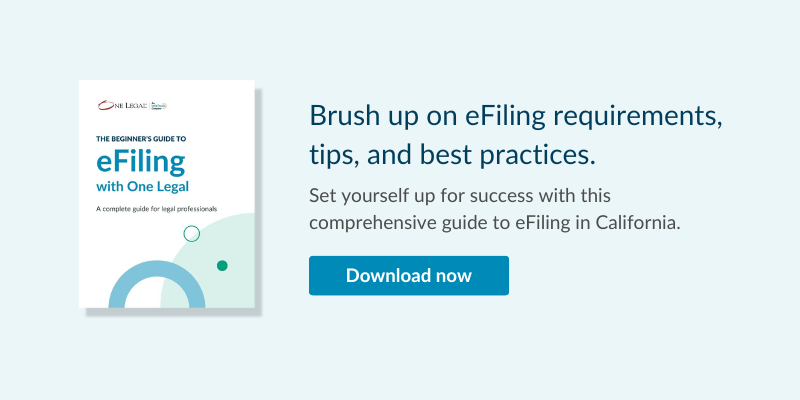eFiling (electronic filing) in Los Angeles can be tricky to get to grips with, but as more and more courts switch to electronic filing, it’s important for legal professionals to understand the process. eFiling aims to streamline and expedite the court filing process by eliminating the need for physical paperwork and reducing manual handling.
Here is our introduction to eFiling for Los Angeles County Superior Court; we hope it helps.
Let’s get started.
eFiling system
Los Angeles uses an electronic filing system that allows attorneys, litigants, and other authorized users to submit court documents electronically.
The system may have specific requirements and guidelines for filing various types of documents.
CRC Rule 2.251
Rule 2.251 outlines the procedures and requirements for the electronic service of legal documents in civil actions in Los Angeles. Here is a summary of the key points:
(a) Authorization for electronic service
When a document can be served by mail, express mail, overnight delivery, or fax transmission, it may also be served electronically, subject to the rules specified in the chapter and under certain code sections. Express consent is required for electronic service made under Penal Code section 690.5.
(b) Electronic service by express consent
Parties can indicate their agreement to accept electronic service by serving a notice on all parties and filing it with the court, or by manifesting affirmative consent through electronic means with the court or an electronic filing service provider.
Parties consenting to electronic service also consent to service on the electronic filing service provider as their designated agent for service.
(c) Electronic service required by local rule or court order
Courts may require parties to serve documents electronically in specific civil actions through local rules or court orders.
If electronic filing is required, parties must also serve and accept service of documents electronically from other parties unless otherwise ordered or if the action involves parties not required to file or accept electronic service.
(d) Additional provisions for electronic service required by court order
Courts may order all parties in certain types of actions to serve documents electronically, with some exceptions based on undue hardship or significant prejudice.
The court may combine the order for electronic service with an order for electronic filing.
(e) Maintenance of electronic service lists
Courts that permit or require electronic filing must maintain an electronic service list containing parties’ and other persons’ current electronic service addresses, as provided by the electronically filing parties.
(f) Service by the parties and other persons
Parties and persons consenting to electronic service are responsible for serving documents electronically to all other required recipients.
Electronic service on nonparties requires their consent or is provided for by law or court order.
(g) Change of electronic service address
Parties or persons whose electronic service address changes during a case must promptly file and serve a notice of change of address electronically.
(h) Reliability and integrity of documents served by electronic notification
Parties or persons using electronic notification for service must ensure that the documents served can be viewed and downloaded using the provided hyperlink.
They must preserve the document without alteration until the hyperlink is terminated or provide notice and maintain the hyperlink for 60 days after leaving the case.
(i) Completion of service
Electronic service is complete according to the rules and statutes in place, and if an electronic filing service provider is used, service is complete when the provider electronically transmits the document or sends an electronic notification.
(j) Proof of service
Proof of electronic service shall be made as provided in Code of Civil Procedure section 1013b. Proof of electronic service of moving papers must be filed at least five court days before the hearing.
(k) Electronic service by or on court
The court may electronically serve documents, and a document may be electronically served on the court if the court consents or if electronic service is provided for by law or court order.
Courts supported
eFiling is available for different types of cases, such as civil, criminal, family law, and probate, depending on the court’s policies. Not all courts implement eFiling at the same time, so it’s essential to verify the availability of eFiling for your specific case type and court location.
Where is eFiling supported in Califonia?
eFiling (electronic filing) is supported in many courts throughout California.
The availability of eFiling and the specific case types supported may vary depending on the individual court and its technological capabilities. Generally, larger and more urban courts tend to offer eFiling services more extensively than smaller courts.
Some of the major superior courts in California (including Los Angeles) that support eFiling include:
- Los Angeles Superior Court: Supports eFiling for various case types, including civil, criminal, family law, and probate.
- Orange County Superior Court: Supports eFiling for certain case types, including civil, probate, family law, and small claims.
- San Francisco Superior Court: Supports eFiling for civil, family law, and probate cases.
- San Diego Superior Court: Offers eFiling for civil, family, probate, and small claims cases.
- Alameda County Superior Court: Provides eFiling for civil, family law, and probate cases.
- Riverside County Superior Court: Supports eFiling for various case types, including civil, family law, and probate.
- Santa Clara County Superior Court: Allows eFiling for civil, family law, and probate cases.
- Sacramento County Superior Court: Supports eFiling for civil, probate, and family law cases.
- Ventura County Superior Court: Offers eFiling for civil, probate, and family law cases.
- San Bernardino County Superior Court: Supports eFiling for civil, family law, and probate cases.
For a full, detailed overview of court support for eFiling, check out our Support Center article.
eFiling service providers
To e-file documents, users typically need to register with authorized eFiling service providers approved by the court.
These service providers act as intermediaries between the filers and the court, facilitating the secure submission of documents and ensuring compliance with eFiling rules.
This streamlines the overall filing experience compared to traditional paper methods and non-EFSP providers.
Time and cost savings are significant benefits, as EFSPs eliminate the need for physical visits to the courthouse and reduce expenses related to printing, copying, and postage.
Furthermore, users can access the EFSP platform 24/7, providing greater convenience and flexibility.
Document validation is another valuable feature offered by EFSPs, ensuring that filings meet the court’s technical requirements, reducing the likelihood of rejected or incomplete submissions.
Real-time updates and notifications inform users about successful filings and critical case events.
Additionally, EFSPs like One Legal will provide tools for case management, allowing users to track case progress, view filed documents, and receive timely alerts.
Enhanced security measures, including encryption and authentication protocols, safeguard sensitive legal information during transmission and storage.
Filing fees
eFiling will typically involve specific fees that are distinct from traditional paper filing costs. These fees can vary based on the type of document being filed and the court in which the case is being heard.
Document format
eFiling often requires documents to be submitted in specific digital formats, such as PDFs, and may have limitations on file sizes.
Here are some general guidelines for document format in the Los Angeles Superior Court eFiling system:
- File type: The court typically requires documents to be submitted in PDF (Portable Document Format) format. PDF is a widely used file format that ensures documents retain their original formatting and appearance across different devices and platforms.
- Page size: Documents should be formatted to standard letter size (8.5 inches x 11 inches) for U.S. letter-sized documents. Other specific court rules may apply to different document types or case types.
- File size: The eFiling system usually has limitations on the maximum file size for each document. Ensure that your PDF file adheres to these size restrictions to avoid any issues with the submission.
- Text searchable: Whenever possible, PDF documents should be text-searchable to facilitate easy access to content and enable the court to perform keyword searches when needed.
- Document security: Some documents may require password protection or redaction of sensitive information before submission. Make sure to comply with any specific security requirements set by the court.
- Multiple documents: If your filing consists of multiple documents (e.g., exhibits, attachments), consider combining them into a single PDF file for ease of submission. However, follow any court rules or guidelines regarding the organization of documents.
Secure access
Secure access is required for eFiling in the Los Angeles Superior Court. Authorized users, such as attorneys and litigants, must register with the court’s electronic filing system, providing unique login credentials for authentication. Access levels are role-based, ensuring appropriate permissions for each user.
The system uses encryption to protect confidential information during document transmission and storage. Audit trails track user activities to monitor for any unauthorized access attempts. The court may also require users to undergo training on eFiling procedures and security protocols to ensure compliance.
Notifications and updates
eFiling systems may provide email notifications or alerts regarding the status of filed documents, court hearings, and case updates.
With the Los Angeles Superior Court’s eFiling system, it provides timely notifications and updates to keep users informed about their cases and filings.
When documents are successfully e-filed, users receive immediate confirmation as a receipt. Important case updates, court orders, and upcoming deadlines are communicated through notifications.
Additionally, the system sends alerts and reminders for scheduled hearings and required actions. Users are notified when documents are electronically served on other parties. Changes in filing status, court rulings, and access to filed documents are also relayed through notifications.
Physical Service
There are still instances where you will be required to physically serve, even after eFiling mandates. New cases generally require it and self-represented parties who have not consented to eService will also need to be physically served. Other exceptions include documents such as Writs, Orders to Show Cause, Temporary Restraining Orders, and Orders for Examination.
One Legal is an experienced physical filing and service provider in Los Angeles. When you initiate your case, we automatically ensure you have the option to add physical service to your order.
Conclusion
eFiling (electronic filing) in Los Angeles has revolutionized the court filing process, offering numerous benefits to attorneys, litigants, and the judicial system as a whole.
The convenience of submitting court documents electronically saves time and resources, eliminating the need for physical visits to the courthouse.
Through secure access and encrypted transmissions, sensitive legal information is protected, ensuring confidentiality and privacy. Real-time updates and notifications keep users informed about case developments, deadlines, and court orders.
The adoption of eFiling has led to increased efficiency, streamlined case management, and improved accessibility to the court system. As technology continues to advance, eFiling will likely play an increasingly vital role in enhancing the administration of justice in Los Angeles and beyond.








